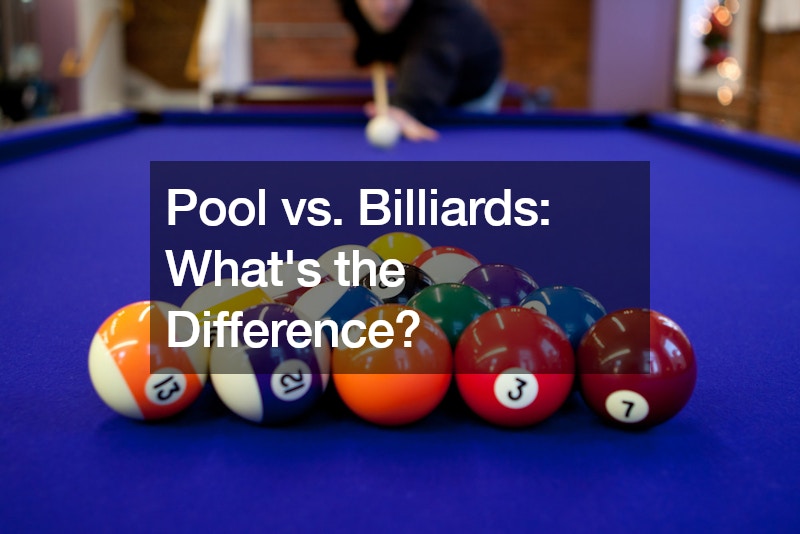In the world of cue sports, the terms pool and billiards are often used interchangeably, leading to confusion among enthusiasts and novices alike. While both involve games played on a table with cues and balls, there are distinct differences between the two. Let us delve into the nuances of pool and billiards to understand their unique characteristics and histories.
1. Pool vs. Billiards: Definitions
To grasp the disparity between pool and billiards, it’s essential to clarify their definitions. Billiards serves as the umbrella term encompassing all cue sports, including a diverse array of games such as eight ball, nine ball, snooker, and more.
Conversely, pool specifically refers to a subset of cue sports that feature pockets on the table, such as eight ball, nine ball, and ten ball.
2. Origins and Etymology
The origins of the terms pool and billiards trace back to intriguing historical contexts. Billiards originated from the French word billart, meaning mace or stick, highlighting the equipment used in early cue sports. On the other hand, pool has a more convoluted etymology, purportedly stemming from poule, an old French term for collective bet or prize.
3. The Evolution of Pool
The evolution of pool as a distinct cue sport can be traced to its association with gambling and betting practices. Early iterations of pool games were often played for monetary stakes, leading to the term pool being adopted to denote collective bets or prizes. As the concept of pool halls, venues where cue sports were played, gained popularity, the term pool became synonymous with the games played within these establishments.
4. The Popularity of Pocket Billiards
Pocket billiards, commonly referred to as pool, gained widespread popularity in the United States during the 19th and 20th centuries. Games such as eight ball, nine ball, and ten ball emerged as staples in American pool halls, attracting enthusiasts and competitors alike. The availability of pool tables for sale further fueled the proliferation of these games, establishing them as quintessential components of American leisure culture.
5. The Diversity of Billiards
While pool games dominate the cue sports landscape in many regions, billiards encompasses a broader spectrum of games beyond those played on tables with pockets. Snooker, a popular cue sport originating in the United Kingdom, is a notable example of a billiards game that diverges from traditional pocket billiards. Additionally, variations like three cushion billiards and carom billiards offer unique challenges and gameplay mechanics absent from pocket billiards games.
6. Contemporary Usage
In contemporary usage, the distinction between pool and billiards may vary depending on regional preferences and cultural contexts. While some communities use the term billiards to refer to all cue sports, others reserve it specifically for non pocket billiards games like snooker and carom billiards. Meanwhile, pool remains synonymous with pocket billiards games such as eight ball and nine ball in many parts of the world.
Equipment and Accessories:
Pool and billiards require specific equipment and accessories to play the game effectively. Cue sticks, also known as cues, are essential tools used to strike the cue ball and maneuver other balls on the table. These cues come in various designs, weights, and materials, catering to the preferences and playing styles of individual players. Additionally, high quality cue tips made of leather or synthetic materials ensure optimal contact with the cue ball, enhancing accuracy and control during shots.
Pool and billiards balls are another critical component of the game, typically made of high quality resin or phenolic resin to withstand the rigors of play. These balls come in different sizes and colors, depending on the game variant being played. A standard pool table features six pockets, usually lined with leather or rubber, to collect the balls during gameplay.
Other essential accessories include chalk, used to enhance friction between the cue tip and ball for better cue ball control, and a rack, used to set up the balls in the initial formation before the game begins. Additionally, specialized accessories like bridge sticks, ball cleaners, and cue holders contribute to a player’s comfort and convenience during gameplay.
Health Benefits:
Playing pool and billiards offers numerous health benefits beyond simple recreation. One of the most significant advantages is improved hand eye coordination, as players must precisely aim their shots and control the movement of the cue ball to achieve desired outcomes. This enhanced coordination can translate to improved performance in other activities requiring manual dexterity and visual acuity.
Moreover, engaging in pool and billiards can help sharpen cognitive skills such as strategic thinking, problem solving, and spatial awareness. Players must strategize their shots, anticipate ball trajectories, and plan their next moves, stimulating mental agility and decision making abilities.
Furthermore, playing pool and billiards can provide a therapeutic outlet for stress relief and relaxation. Focusing on the game and immersing oneself in the strategic challenges can divert attention from daily stressors, promoting mental well being and emotional resilience.
Conclusion
In summary, while pool and billiards share similarities as cue sports played on tables with cues and balls, they differ in terms of their historical origins, gameplay mechanics, and cultural significance. Understanding the distinction between pool and billiards enhances one’s appreciation for the rich tapestry of cue sports and the diverse array of games within the broader category of billiards. Whether you’re a seasoned player or a curious newcomer, exploring the intricacies of pool and billiards promises a rewarding journey into the world of cue sports.
.




